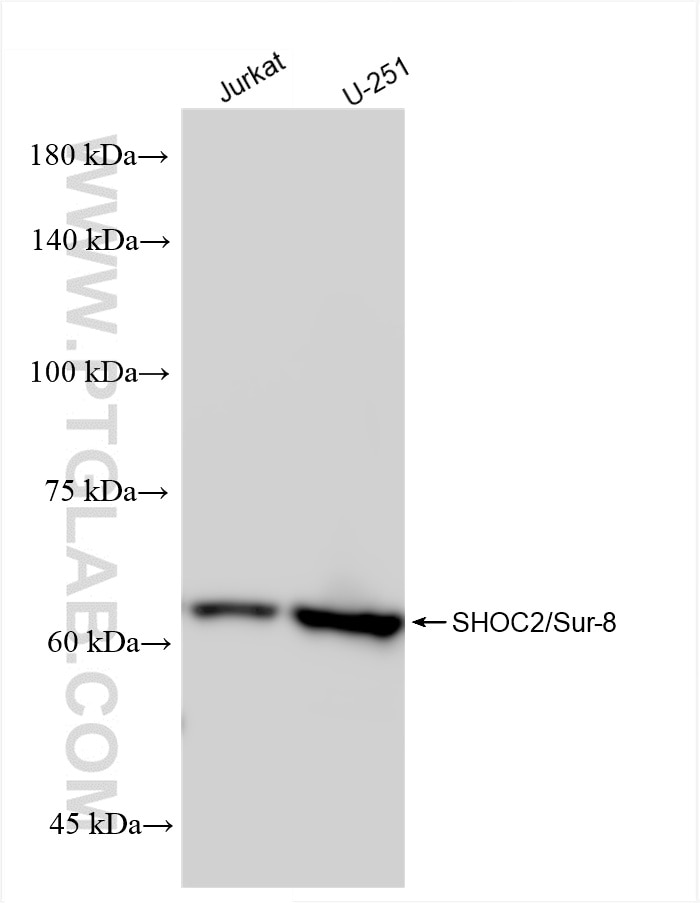Tested Applications
| Positive WB detected in | Jurkat cells, U-251 cells |
Recommended dilution
| Application | Dilution |
|---|---|
| Western Blot (WB) | WB : 1:5000-1:50000 |
| It is recommended that this reagent should be titrated in each testing system to obtain optimal results. | |
| Sample-dependent, Check data in validation data gallery. | |
Product Information
84917-5-RR targets SHOC2/Sur-8 in WB, ELISA applications and shows reactivity with human samples.
| Tested Reactivity | human |
| Host / Isotype | Rabbit / IgG |
| Class | Recombinant |
| Type | Antibody |
| Immunogen |
CatNo: Ag11754 Product name: Recombinant human SHOC2 protein Source: e coli.-derived, PGEX-4T Tag: GST Domain: 235-583 aa of BC050445 Sequence: GELCNLITLDVAHNQLEHLPKEIGNCTQITNLDLQHNELLDLPDTIGNLSSLSRLGLRYNRLSAIPRSLAKCSALEELNLENNNISTLPESLLSSLVKLNSLTLARNCFQLYPVGGPSQFSTIYSLNMEHNRINKIPFGIFSRAKVLSKLNMKDNQLTSLPLDFGTWTSMVELNLATNQLTKIPEDVSGLVSLEVLILSNNLLKKLPHGLGNLRKLRELDLEENKLESLPNEIAYLKDLQKLVLTNNQLTTLPRGIGHLTNLTHLGLGENLLTHLPEEIGTLENLEELYLNDNPNLHSLPFELALCSKLSIMSIENCPLSHLPPQIVAGGPSFIIQFLKMQGPYRAMV Predict reactive species |
| Full Name | soc-2 suppressor of clear homolog (C. elegans) |
| Calculated Molecular Weight | 582 aa, 65 kDa |
| Observed Molecular Weight | 65 kDa |
| GenBank Accession Number | BC050445 |
| Gene Symbol | SHOC2/Sur-8 |
| Gene ID (NCBI) | 8036 |
| Conjugate | Unconjugated |
| Form | Liquid |
| Purification Method | Protein A purification |
| UNIPROT ID | Q9UQ13 |
| Storage Buffer | PBS with 0.02% sodium azide and 50% glycerol, pH 7.3. |
| Storage Conditions | Store at -20°C. Stable for one year after shipment. Aliquoting is unnecessary for -20oC storage. 20ul sizes contain 0.1% BSA. |
Background Information
SHOC2 is also named as Sur-8. The SHOC2 protein, along with MRAS and PP1C, forms a high affinity, heterotrimeric holoenzyme that activates RAF kinases by dephosphorylating a specific phosphoserine (PMID: 37074066). SHOC2, a key protein mediating the Ras-Raf-ERK pathway, could act as a scaffolding protein to facilitate the activation of the pathway by mediating the interaction of key components of the pathway (PMID: 37170083). The scaffold protein Shoc2 is a critical modulator of ERK1/2 signals, and mutations in the shoc2 gene lead to the human developmental disease known as Noonan-like syndrome with loose anagen hair (NSLH) (PMID: 36265687).
Protocols
| Product Specific Protocols | |
|---|---|
| WB protocol for SHOC2/Sur-8 antibody 84917-5-RR | Download protocol |
| Standard Protocols | |
|---|---|
| Click here to view our Standard Protocols |




